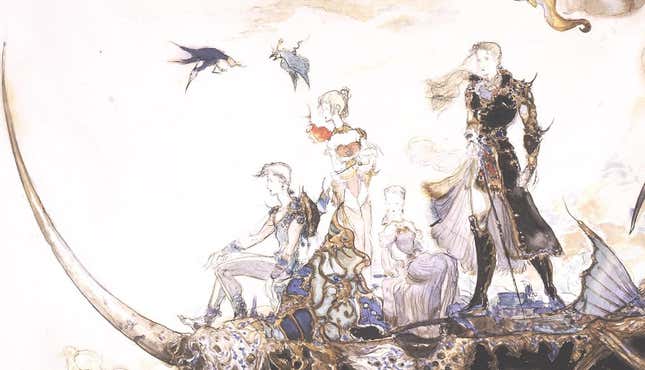
Talking about Final Fantasy has become complicated. A lot of my favorite Final Fantasy memories are from games in the series that are over a decade old.
I’ve played through most of the main series Final Fantasy games, aside from FFV and the online ones. I genuinely enjoyed most of them (even XIII), though none impacted me the way IV, VI, and VII did. Because of that, Final Fantasy’s must-play status has changed in my gaming life from something I had to buy Day 1 and play through as fast as I could, to the point where I didn’t even get to FFXV for a few years after its release.
A year or so ago, I read Kotaku editor Chris Kohler’s book about Final Fantasy V, and realized I had to play it. He recommended the Game Boy Advance version as the definitive version, which I’ve finally gotten to.

The Prelude of Empty Skies
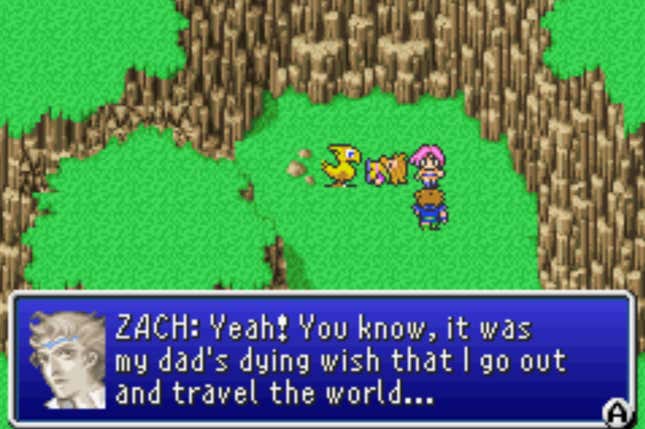
What began as a curious interest in the sole retro Final Fantasy game I’d missed evolved into a remembrance of what I used to love about the series. It wasn’t the amazing production values or the elaborate combat system, which have become such a big focus of the Final Fantasy games. FFV had a party of characters I cared about and a story that made me feel like I was invested in what happened. As always, the fate of the world is at stake—after all, Final Fantasy has to live up to the “final” part of its name. But there wasn’t a massive cast of characters that make an appearance, then get put aside in favor of the main party which usually consists of three primary members. Final Fantasy V concentrates on four people: an adventurer named Bartz, a princess named Lenna, a pirate called Faris, and an amnesiac warrior Galuf.
They’re engaged in a generational battle that has deeper repercussions revolving around the questions of ecology and environment. The harvesting of crystals is spurring an economic boom throughout their world, especially in kingdoms like Karnak. But the prosperity comes at a cost. The scholars of the world, many of whom are concentrated in the Library of the Ancients, are warning about the crystals’ usage because they’re concerned overuse will lead to their destruction. Unfortunately, the scientists are mostly met with scorn, with some townspeople referring to them as “crackpots” and the Queen of Karnak even building a wall to keep them out.
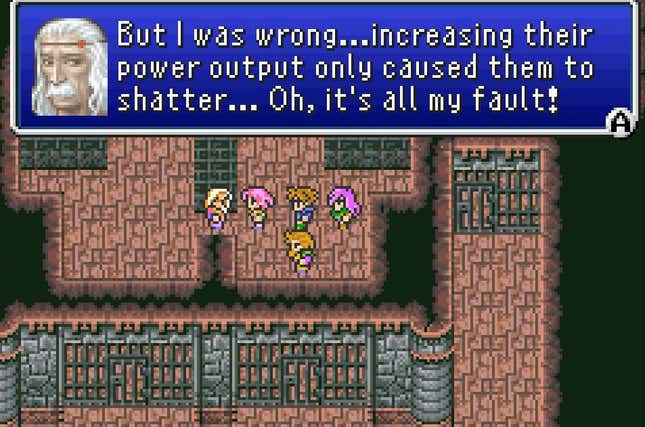
Professor Cid Previa, who created the machines to amplify the power of the crystals, realizes that they have to be stopped. But his attempt to change crystal policy leads to his imprisonment. The people are set in their ways and refuse to change. When your party attempts to stop the Fire Crystal, but fails, the entire kingdom is destroyed. Cid broods in despair, feeling responsible for everything that’s happened. Nothing you do can convince him to help your further. It’s a sobering and depressing moment that made me wonder: Why don’t people ever listen to messages of imminent doom until it’s too late?
The bitter apathy that weighs down on Cid seemed all too familiar with the state of contemporary politics. It’s only after reuniting with his grandson, Mid, that Cid gets out of his depressed state of mind. Mid, energetic and still full of hope, yells at his grandfather and snaps him out of it.
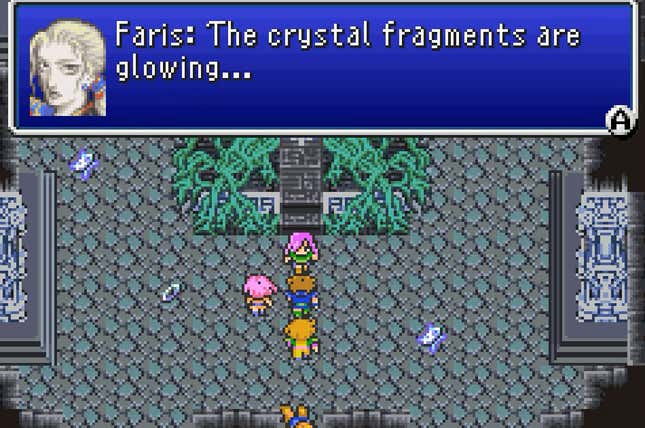
Unfortunately, even with their help, the last remaining crystal shatters. Setting aside the economic and social implications that the loss of the crystal signifies, the even more terrifying consequence is that the main villain, ExDeath, has been released. It turns out he’d been sealed away by the crystals many years ago.
A touching sequence follows shortly after ExDeath’s release. Aboard their airship, Bartz blames himself for the destruction of the crystals. Galuf shakes his head; he won’t let Bartz, and as an extension, their society, take the blame, despite their exploitation of the crystals. Instead, Galuf points out that they, as the Warriors of Dawn, had the chance to return ExDeath to their world, but instead, sealed him in Bartz’s. He owns up to his mistake, while taking action to try to save both worlds again by returning to his world. His sense of accountability and honor was refreshingly welcome.
My Home, Sweet Home
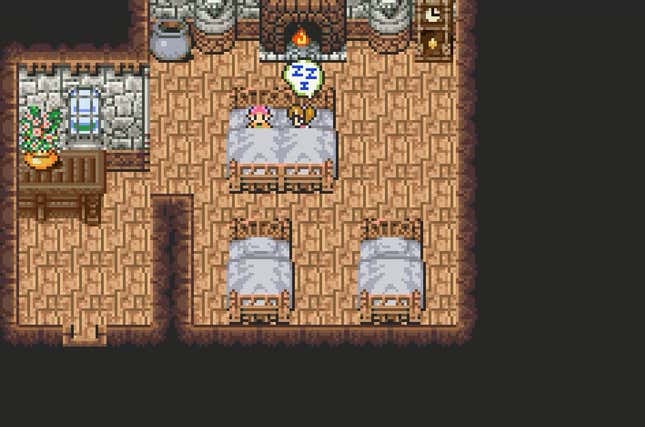
I had a baby about a year ago, so I think a lot more about the world we’ll be leaving behind and how my actions impact my kid. It’s sometimes funny how I’ll be engrossed into doing something, look over, and see my baby watching me. Sometimes, the baby will even imitate my gestures and sounds, making me more cognizant of what I do on a daily basis.
So there’s something deeply moving in the quest of the two sisters, Faris and Lenna. They’re trying to find their father, King Tycoon, who is being controlled by a mysterious force. The burgeoning relationship between the two sisters is touching, especially since it follows the death of Faris’ sea dragon Syldra. I love the visits the party has back to Tycoon and the flashbacks the two sisters have of each other. They’re simple, but convey a whole lot of emotion even though the dialogue is sparse. I could sense the feeling of loss for everything they’d missed in each other’s lives.
Lenna’s theme music has become one of my absolute favorites, especially the rendition from the game’s arranged album Dear Friends.
I found it tragic that King Tycoon, who initially sets out at the beginning of the game to investigate the anomalies at the Wind Shrine, gets unwittingly used by ExDeath to harm their world even more. Villains are at their best when they exploit good intentions, and with the king, he ends up making matters much worse. Again, it’s the younger generation that snaps the king out of his trance with a literal thunderbolt. But by then, it’s too late, and Tycoon gives up the only thing he has left to save his two daughters. I have to admit, I got emotional as he apologized to his daughters about his actions right before he dies. I could feel his disappointment with his own life and how much he regretted leaving the burden of their generation’s sins to their children.
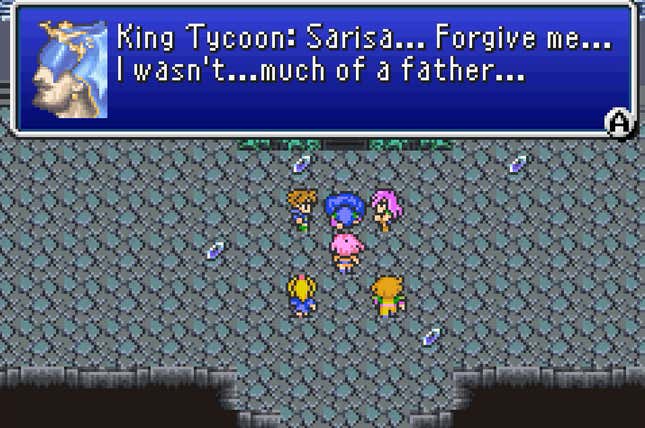
Parental loss is a recurring idea in the game. One of the most memorable parts is when Bartz returns to his hometown, Lix. As soon as you enter the town, people recognize Bartz and you even learn the story of how he gained his fear of heights, reminiscent of a scene from Alfred Hitchcock’s film Vertigo. When Bartz goes back to his own house and listens to a music box, he has a flashback to the night his mother passed away. The music plays throughout the entire scene and you learn Bartz’s mother has been suffering bad spasms. His father lies to his mother that he’s not going anywhere and insists his wife get some rest to heal from her sickness. But to Bartz, he reveals the truth that he has to leave to fight “bad guys” and is about to sneak out of the house. Suddenly, his mother collapses.
“Stella!!!” Bartz’s father yells.
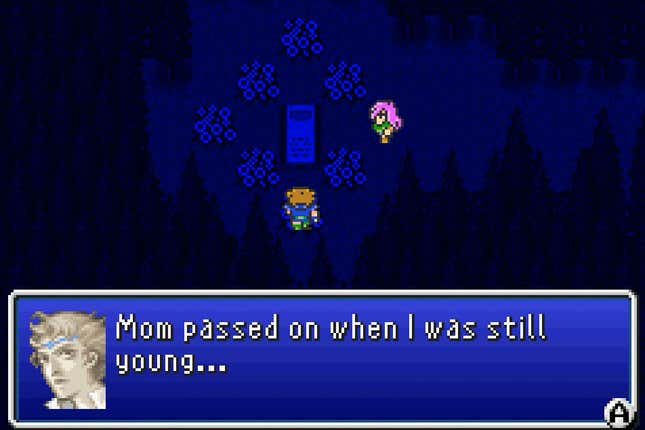
That night, if you sleep in the motel, Bartz goes to the grave of his parents. Faris comes out to meet him and Bartz reveals that his father “always wanted to be buried here with Mom.” Bartz rubs the dust off the gravestone, and in a sense, their destiny is interlinked in a way he can’t imagine. Who were those “bad guys” his dad referred to? How is his destiny connected with the crystals?
I loved the way this was done in simple scenes with minimal dialogue and music. It’s amazing to me that a game could convey so much emotion through these 16-bit sprites. I cared about Bartz, could imagine him traveling the world with his grieving father, and understood more about him the first time we meet him as a wanderer without any real companions aside from his chocobo, Boko.
The Four Warriors of Dawn
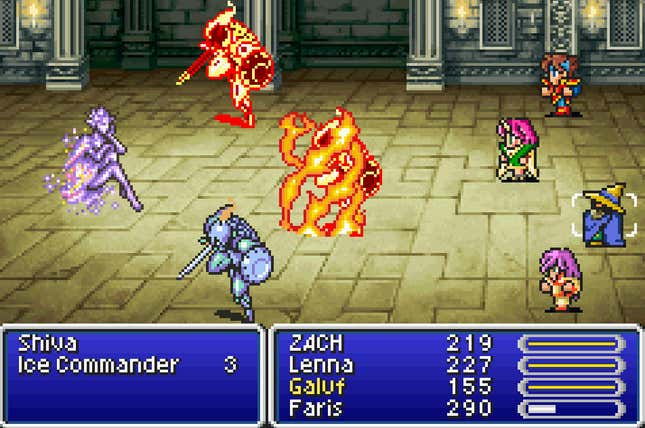
Final Fantasy V’s battles are tough compared to the other Final Fantasy games. Honestly, I only died a few times in FFXV, and I don’t think I died at all in X, XII or XIII, but I’ve died a bunch of times in FFV. It’s because battle isn’t just a matter of leveling up your characters. The class system makes a massive difference in your battles and you have to plan strategically. I actually emailed Chris to ask his class recommendations towards the beginning of the game and I’m glad he mentioned the monks as I never would have thought to use them. They kick ass at the offset with their plentiful physical strength. Experimentation is key to success, as is leveling up the classes with Ability Points so you can gain their attributes and use them while in another class.
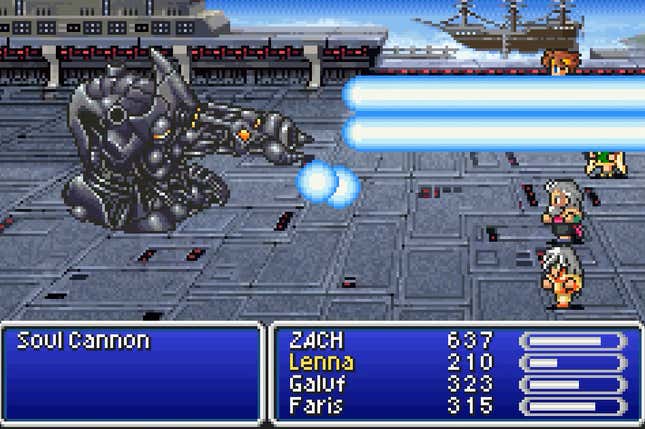
There’s one airship battle that I died on a bunch of times. It’s the boss called the Soul Cannon with a countdown that will release a destructive wave blast. The first few times I fought the cannon, I tried to overpower it, using powerful Thunder spells and enchanting blades with Thunder to try to whittle away at its HP. But since it was draining my HP constantly, just surviving the cannon fire wasn’t enough. I tried different combinations of Mystic Knights, Monks, Black Mages, and Summoners. I even brought out lightning scrolls with my ninjas. I still died. I hoped leveling up my characters would help, but they did little against the powerful Diffusion Beam.
The tide only changed when I employed a Time Mage. I cast Slow on the cannon and then used Haste on my own party members to accelerate their turns, combining it with a series of lightning elemental attacks. I had a harder time beating this boss than the final boss of FFXV, Ardyn, who was a cakewalk in comparison. But victory was sweet when I was finally able to land my airship in the Ronka Ruins.
I’m only about a third of the way through Final Fantasy V, just having finished the first world. But I’m looking forward to getting to playing with all the different classes and finding more about the differences in the worlds, the backstory of the Four Warriors of Dawn, as well as how the characters develop their friendships. I am glad I waited this long to play the game as it’s had a lot more meaning for me as a father, especially in the relationships between the children and their parents that’s been so key to the characters in the first part of the game. It’s exciting for me to be so excited about a Final Fantasy game again, and I hope one day I can share the journey with my own kid.